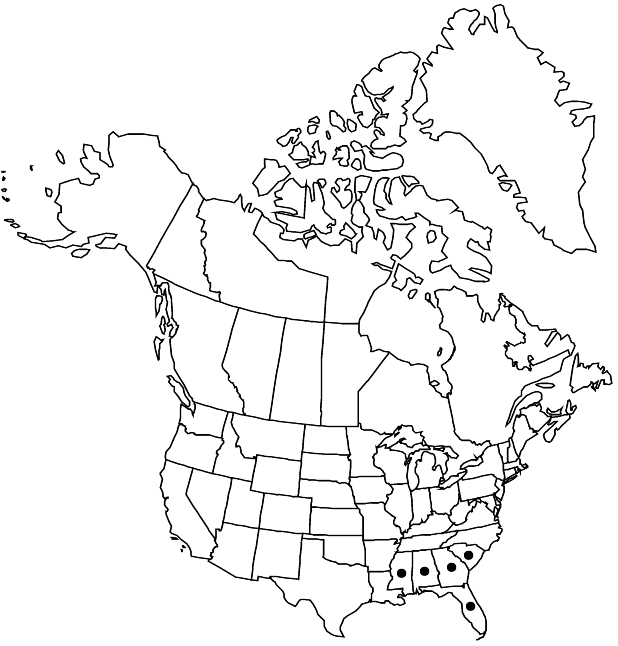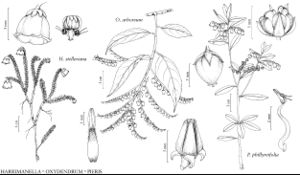Difference between revisions of "Pieris phillyreifolia"
in A. P. de Candolle and A. L. P. P. de Candolle, Prodr. 7: 599. 1839 ,.
FNA>Volume Importer |
FNA>Volume Importer |
||
| Line 22: | Line 22: | ||
}}<!-- | }}<!-- | ||
| − | --><span class="statement" id="st-undefined" data-properties=""><b>Shrubs </b>or vines, to 1 m, climbing to 10 m within fibrous bark of Taxodium or Chamaecyparis by means of flattened rhizomes that, at intervals, give rise to emergent branches; twigs multicellular stipitate-glandular-hairy, otherwise sparsely to moderately unicellular-hairy. <b>Stems</b> ± terete. <b>Leaf</b> blades ovate, elliptic, or slightly obovate, (1–)2–6(–7) × (0.3–)0.3–2(–2.7) cm, base narrowly cuneate to rounded, margins obscurely to clearly toothed, especially near apex, revolute, apex acute to rounded. <b>Inflorescences</b> axillary racemes, from near stem apex; bracteoles near apex to middle of pedicel. <b>Flowers</b>: calyx lobes 3.5–5 × 1–1.5 mm; corolla cylindric-urceolate, weakly 5-ridged, 6–8(–8.5) × 4–5 mm; filaments geniculate, 4–6 mm, glabrous; style strongly sunken into ovary apex. <b>Capsules</b> subglobose, 2.5–4 × 3.5–5.3 mm, glabrous; placentae central to nearly basal. <b>Seeds</b> angular-ovoid to obovoid or narrowly conic, not winged; testa cells isodiametric.</span><!-- | + | --><span class="statement" id="st-undefined" data-properties=""><b>Shrubs </b>or vines, to 1 m, climbing to 10 m within fibrous bark of <i>Taxodium</i> or <i>Chamaecyparis</i> by means of flattened rhizomes that, at intervals, give rise to emergent branches; twigs multicellular stipitate-glandular-hairy, otherwise sparsely to moderately unicellular-hairy. <b>Stems</b> ± terete. <b>Leaf</b> blades ovate, elliptic, or slightly obovate, (1–)2–6(–7) × (0.3–)0.3–2(–2.7) cm, base narrowly cuneate to rounded, margins obscurely to clearly toothed, especially near apex, revolute, apex acute to rounded. <b>Inflorescences</b> axillary racemes, from near stem apex; bracteoles near apex to middle of pedicel. <b>Flowers</b>: calyx lobes 3.5–5 × 1–1.5 mm; corolla cylindric-urceolate, weakly 5-ridged, 6–8(–8.5) × 4–5 mm; filaments geniculate, 4–6 mm, glabrous; style strongly sunken into ovary apex. <b>Capsules</b> subglobose, 2.5–4 × 3.5–5.3 mm, glabrous; placentae central to nearly basal. <b>Seeds</b> angular-ovoid to obovoid or narrowly conic, not winged; testa cells isodiametric.</span><!-- |
-->{{Treatment/Body | -->{{Treatment/Body | ||
| Line 29: | Line 29: | ||
|elevation=0-100 m | |elevation=0-100 m | ||
|distribution=Ala.;Fla.;Ga.;Miss.;S.C. | |distribution=Ala.;Fla.;Ga.;Miss.;S.C. | ||
| − | |discussion=<p>Pieris phillyreifolia is the only viny member of the Ericaceae in the United States; like P. cubensis Small of Cuba and P. swinhoei Hemsley of China, it has more or less isodiametric testa cells; it has been placed in sect. Phillyreoides Bentham & Hooker f.</p> | + | |discussion=<p><i>Pieris phillyreifolia</i> is the only viny member of the <i>Ericaceae</i> in the United States; like P. cubensis Small of Cuba and P. swinhoei Hemsley of China, it has more or less isodiametric testa cells; it has been placed in sect. Phillyreoides Bentham & Hooker f.</p> |
|tables= | |tables= | ||
|references= | |references= | ||
| Line 53: | Line 53: | ||
|publication year= | |publication year= | ||
|special status= | |special status= | ||
| − | |source xml=https://jpend@bitbucket.org/aafc-mbb/fna-data-curation.git/src/ | + | |source xml=https://jpend@bitbucket.org/aafc-mbb/fna-data-curation.git/src/8f726806613d60c220dc4493de13607dd3150896/coarse_grained_fna_xml/V8/V8_972.xml |
|subfamily=Ericaceae subfam. Vaccinioideae | |subfamily=Ericaceae subfam. Vaccinioideae | ||
|genus=Pieris | |genus=Pieris | ||
Revision as of 18:10, 18 September 2019
Shrubs or vines, to 1 m, climbing to 10 m within fibrous bark of Taxodium or Chamaecyparis by means of flattened rhizomes that, at intervals, give rise to emergent branches; twigs multicellular stipitate-glandular-hairy, otherwise sparsely to moderately unicellular-hairy. Stems ± terete. Leaf blades ovate, elliptic, or slightly obovate, (1–)2–6(–7) × (0.3–)0.3–2(–2.7) cm, base narrowly cuneate to rounded, margins obscurely to clearly toothed, especially near apex, revolute, apex acute to rounded. Inflorescences axillary racemes, from near stem apex; bracteoles near apex to middle of pedicel. Flowers: calyx lobes 3.5–5 × 1–1.5 mm; corolla cylindric-urceolate, weakly 5-ridged, 6–8(–8.5) × 4–5 mm; filaments geniculate, 4–6 mm, glabrous; style strongly sunken into ovary apex. Capsules subglobose, 2.5–4 × 3.5–5.3 mm, glabrous; placentae central to nearly basal. Seeds angular-ovoid to obovoid or narrowly conic, not winged; testa cells isodiametric.
Phenology: Flowering winter–spring.
Habitat: Taxodium, Chamaecyparis, or broad-leaved swamps, wet depressions in pine forests
Elevation: 0-100 m
Distribution

Ala., Fla., Ga., Miss., S.C.
Discussion
Pieris phillyreifolia is the only viny member of the Ericaceae in the United States; like P. cubensis Small of Cuba and P. swinhoei Hemsley of China, it has more or less isodiametric testa cells; it has been placed in sect. Phillyreoides Bentham & Hooker f.
Selected References
None.
